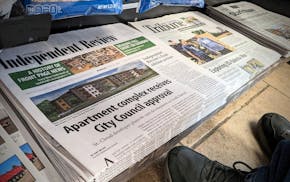The much-debated Southwest light-rail line is edging closer to final approval.
A Minneapolis City Council panel begrudgingly gave initial approval to the line Wednesday, despite continued concerns about the possible impact on city lakes and neighborhoods.
"We are building a regional transit system that serves suburban commuters over urban neighborhoods," said Council Member Lisa Bender of the route, which largely follows a sparsely populated Minneapolis freight corridor into downtown. "That is just a fact."
The council's transportation committee voted 4-2 to recommend final city approval for the project, the last local approval needed for the $1.6 billion line from Eden Prairie to downtown Minneapolis — expected to open in 2019. The full council is expected to take a final vote on that measure Friday morning.
In a separate but related meeting Wednesday, the council approved two agreements aimed at preserving public control of the rail corridor. Those are intended to limit the possibility of freight traffic increasing or carrying more dangerous cargo by maintaining an agreement with the Twin Cities & Western Railroad Company.
Some resident concerns about the lack of an updated environmental review also resonated with council members. The existing environmental assessment was completed in 2012, before rerouting freight traffic to St. Louis Park was scrapped in favor of building a shallow light-rail tunnel to allow both trains to fit through the Kenilworth corridor. The new environmental review will be finished in January 2015.
"I've been concerned with regards to not having the [new environmental impact statement], and not having a chance to review that before we make this decision," said Council Member Blong Yang, one of two to vote against the measure in committee.
The city attorney, Susan Segal, said the council has a clear deadline to provide consent for the project — Aug. 30. "Whether or not the environmental review is required before consent is an issue that may well ultimately be resolved by the courts," Segal said, alluding to possible lawsuits over the line.
Council Member Lisa Goodman predicted that if the review discovers environmental impacts to the lakes, other government and community leaders will pressure the city to run the trains at ground level and demolish nearby homes. "[They] are going to be saying, 'You're too far along now to say no,' " Goodman said.
Because Southwest travels through a largely barren corridor west of downtown, several advocacy groups have fought for improved bus amenities and connections to give Minneapolis residents — particularly on the North Side — better access.
Mayor Betsy Hodges said the Metropolitan Council is not adequately responding to those groups or ensuring that city residents' needs are getting equal treatment.
The Met Council's "equity initiatives" are not enough, Hodges said. "The response on equity from the Met Council has been disappointing at best," she said. "They have made many agreements to process and they have made no agreements to outcome, thus far."
Asked later what specifically she would like to see, Hodges cited firmer commitments about bus frequency and shelters with amenities. A recent Star Tribune analysis found a lack of shelters at many highly used stops in north Minneapolis that qualify for them. "How many and where?" Hodges said of the shelters. "And are they heated?"
Many of the Minneapolis stations on the Southwest line are hard to access, under current conditions. As a result, project planners envision fairly low ridership at the Minneapolis stops outside of downtown, except for a station west of Lake Calhoun, where ridership could reach 3,000 per day.
Two of those five stops would have just 300 riders a day under the projections, which largely don't account for development spurred by the line. The Penn station, south of Bryn Mawr, would have 930 daily riders.
If the council grants final approval Friday, a number of steps will be set in motion. Southwest planners will pursue consulting and advance design contracts, said Meredith Vadis, a Met Council spokeswoman. They also will get closer to formally applying for the federal dollars expected to fund about half of the project costs.
Yang and Council Member Cam Gordon were the two votes against approving the project. Gordon said it is significant that freight rail was not relocated from the corridor, adding that he has concerns about the impact on adjacent bikeways and the Chain of Lakes.
"I think what we're getting is kind of an incomplete product and we're also getting a different product than what we made commitments for when we agreed to this alignment," Gordon said.
Eric Roper • 612-673-1732
Twitter: @StribRoper

In Grand Rapids, Itasca Pride is planning its first event, but there is already pushback
One person shot at YMCA in Coon Rapids

BCA says man pointed pistol-style BB gun at officers before he was shot in Woodbury

Former diversity worker sues University of Minnesota after firing over swastika photo
